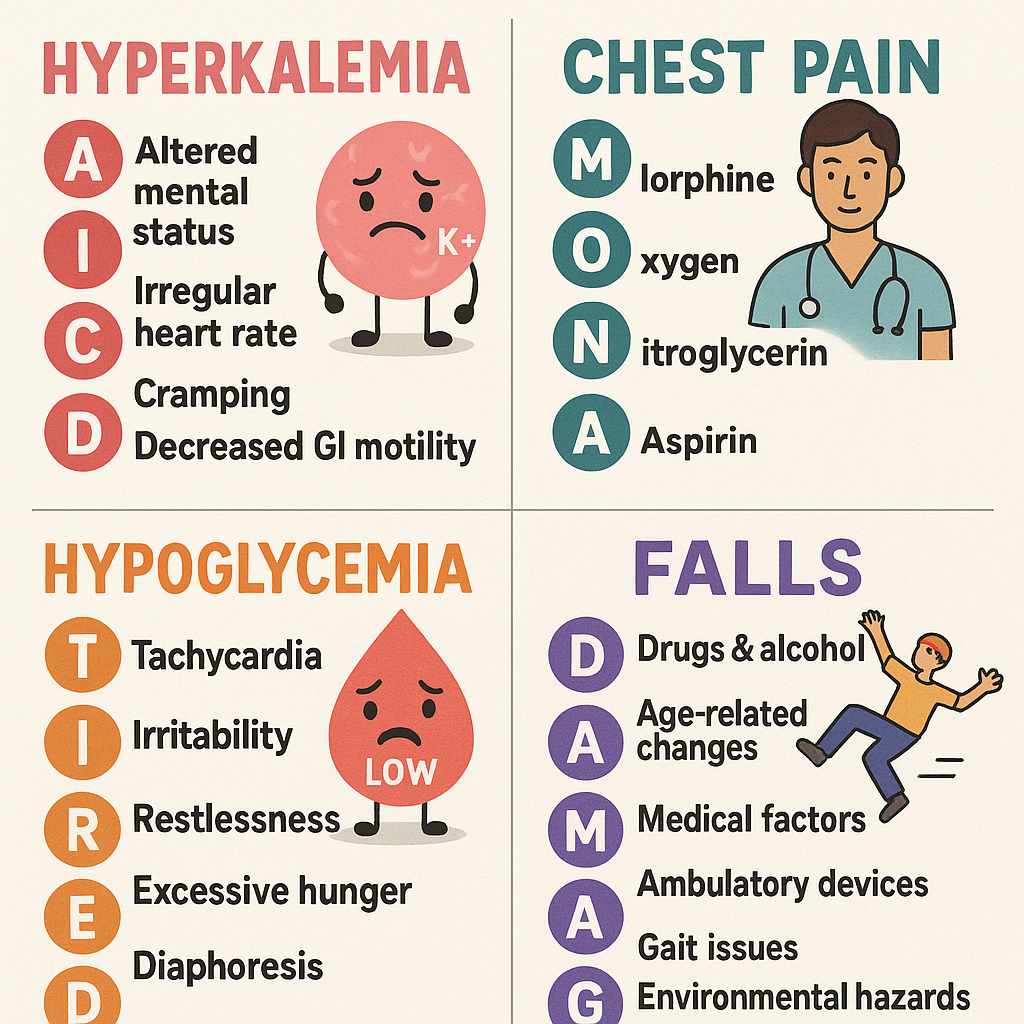Medical-Surgical nursing (Med-Surg) can feel overwhelming with the sheer volume of diseases, medications, and interventions nurses need to remember. Thankfully, mnemonics are a powerful tool to simplify memory and make NCLEX prep easier. Whether you’re a nursing student, RN nurse, or a registered nurse refreshing knowledge, these mnemonics will help you recall key Med-Surg concepts quickly.
Why Mnemonics Matter in Nursing
Med-Surg is one of the largest sections tested on the NCLEX. For a nurse, fast recall of symptoms, interventions, and priorities can mean the difference between safe and unsafe care. Mnemonics create mental shortcuts, allowing nursing students and practicing RNs to retrieve information under pressure.
Using mnemonics as part of your nursing bundle study resources makes reviewing easier and more effective.
🔑 Common Med-Surg Nursing Mnemonics
1. MONA for MI (Myocardial Infarction)
Morphine, Oxygen, Nitroglycerin, Aspirin
👉 Used to remember initial treatment for patients with suspected heart attack.
2. FAST for Stroke Warning Signs
Face droop, Arm weakness, Speech difficulty, Time to call 911
👉 Every registered nurse should be able to identify early stroke symptoms quickly.
3. RICE for Fractures or Sprains
Rest, Ice, Compression, Elevation
👉 Quick first aid intervention for musculoskeletal injuries, often seen in Med-Surg.
4. SPICES for Geriatric Assessment
Sleep disorders, Problems with eating, Incontinence, Confusion, Evidence of falls, Skin breakdown
👉 Essential nursing tool for older adult patients in Med-Surg settings.
5. DABDA for Stages of Grief
Denial, Anger, Bargaining, Depression, Acceptance
👉 Important for psychosocial aspects of Med-Surg and NCLEX questions on patient care.
6. ABCDE for Emergency Prioritization
Airway, Breathing, Circulation, Disability, Exposure
👉 A top NCLEX nursing priority rule every RN nurse must master.
7. TACO for Transfusion Reaction Signs
Temperature increase, Allergic reaction, Chills, Overload (fluid)
👉 Critical for nurses administering blood transfusions in Med-Surg units.
8. HOT and DRY, Sugar High (Hyperglycemia) / COLD and CLAMMY, Need Some Candy (Hypoglycemia)
👉 A simple diabetes nursing mnemonic to quickly differentiate glucose emergencies.
💡 Tips for Using Mnemonics in Nursing Study
- Add mnemonics to your nursing bundle flashcards.
- Practice recalling them daily to improve memory retention.
- Apply mnemonics during clinical scenarios to strengthen critical thinking.
- Use them as a quick review before NCLEX exams.
Final Thoughts
Mnemonics make Med-Surg nursing easier to master by simplifying complex information into quick memory tricks. For any registered nurse, RN nurse, or nursing student, these mnemonics are essential tools in both exam prep and clinical care.
Incorporating mnemonics into your nursing bundle study plan can boost confidence, help you pass the NCLEX, and make you a more effective nurse in practice.

